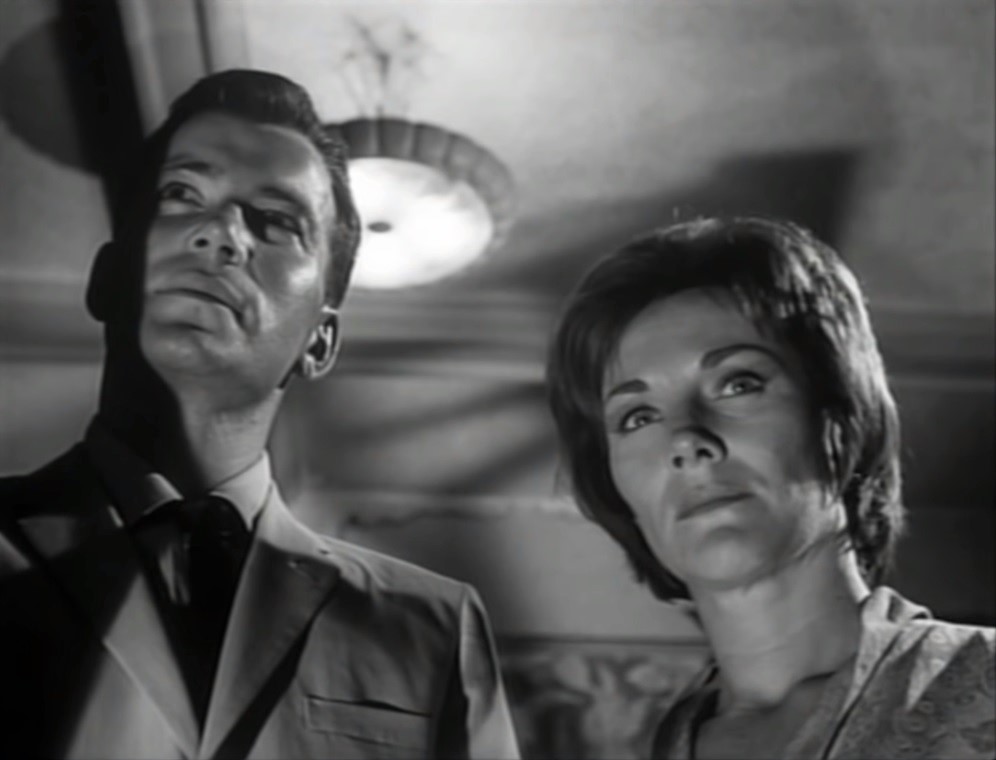United States, 1962
Directed by Roger Corman
With William Shatner (Adam Cramer), Frank Maxwell (Tom McDaniel), Beverly Lunsford (Ella McDaniel), Katherine Smith (Ruth McDaniel), Leo Gordon (Sam Griffin), Jeanne Cooper (Vi Griffin), Robert Emhart (Verne Shipman), Charles Barnes (Joey Greene)

Adam Cramer is a professional troublemaker sent by a far-right organization based in Washington, DC, to a little town of the Deep South, to marshal the local population in a fresh attempt to prevent the enforcement of the landmark ruling of the US Supreme Court on desegregation in the schools. It hadn’t been readily accepted and the deliberate speed the Justices wished often became a deliberate slowness. This is obviously the case of this town; but still young African-Americans can now go to the town’s high school, to the dismay and anger of many, essentially poor, European-Americans.
Cramer is going to use his charm, his knack to demagoguery, and his wits to discredit the integrative process. If he can easily get the material support of the richest man of the land, Verne Shipman, and dazzles the populace, he finds a strong opponent in the editor of the community’s newspaper, Tom McDaniel, who eventually acknowledges he supports integration, jeopardizing his family life (his wife is against, her father-in-law belongs to the local chapter of the Ku Klux Klan and his daughter Ella is attracted to the newcomer) and at the end his own life. Another adversary appears, because of the womanizing of Cramer; rep Sam Griffin vows to take revenge for the one-night stand Cramer had with his psychologically fragile wife Vi, leading her to break up and flee. But the biggest problem Cramer must cope with turns out to be the impatience and taste for violence of the people he has mobilized, and the situation he has created becomes harder to control, until his shenanigans to frame a brilliant Black student, Joey Greene, fizzle out, and his supporters desert him.
This no-frills and no-flab flick, lasting only 84 minutes, deals with a highly sensitive topic in a clear but thorough way. This B-production grappling with serious analysis got a favorable critical reception but was one of the rare commercial failures in the career as a producer of Roger Corman (out of a total in August 2018 of 415 films). This outcome for a film he has always been proud to have directed miffed him and he tried to release again “The Intruder” at various times with different titles. But it seems the average American moviegoer was not quite ready to watch such this part of US history on the big screen.
The portrait of a local, modest, White-dominated, community could be uncomfortable as a deeply stubborn and narrow-minded mindset is on full display, quick to turn violent to assert prejudices; the bombing of the church of the Black neighborhood and the attendant death of its pastor during a nightly show of KKK defiance are powerfully shot and stand as a disgusting act of wanton destruction. More chilling images appeared before, as Cramer stood up on the steps of the local court, haranguing the public, his person constantly shot on medium shots or even close-ups taken from a low angle; the public is generally shoot precisely the same way, emphasizing the communion of the speaker and the listeners around the same extremist political viewpoint.
Yet at the very end, when Cramer tries to vindicate himself with the same words, while he is still shot the same way, his audience this time is shot with the camera on the same level as their torsos, slightly lingering on the blank faces they have. Their communion is over, and the final gesture of Verne Shipman (slapping Cramer the same way he previously slapped Joey Greene to humiliate the teen) highlights how distrustful they are now – and how disappointed they are that, obviously, nothing can change the new law of the land. The fact is that they were genuinely misled, and the film shows it. The personal journey of intellectual leader Tom McDaniel, eventually dragging along him his wife and daughter, gives another, more dramatic and poignant, layer to what is essentially an attentive observation of people grappling with a new and unwanted situation. The film does not condone their intolerance, but it does not draw a caricature of the Deep South folks. They remain, inside their problematic heritage, decent people who can reject an intruder going too far (other filmmakers were not so kind with this kind of crowds, starting with Fritz Lang in “Fury” [1936]).
As it happens, Cramer is not a clear-cut figure. Despite his suave cleverness, he seems like a naïve setting about manipulating people without reckoning the risks and the feasibility of the endeavor. Sam points to his inner weakness during their confrontation, which is to lack guts and to be too clever by a half, and William Shatner’s performance does hint at the insecurity of his character below his brash attitude – even this brashness becomes easily an abrasive show of authority hard to tolerate. Always clad in his white suit and sporting a fixed smile, he never quite fits in and his fall sent him back to his initial loneliness of a peddler specialized in ideas he clearly desperately needs to sustain an ambition (as Vi guessed). It is hard when he collapses at the end to feel sorry for him, but it is easy to appreciate how weak a wicked man really is.

